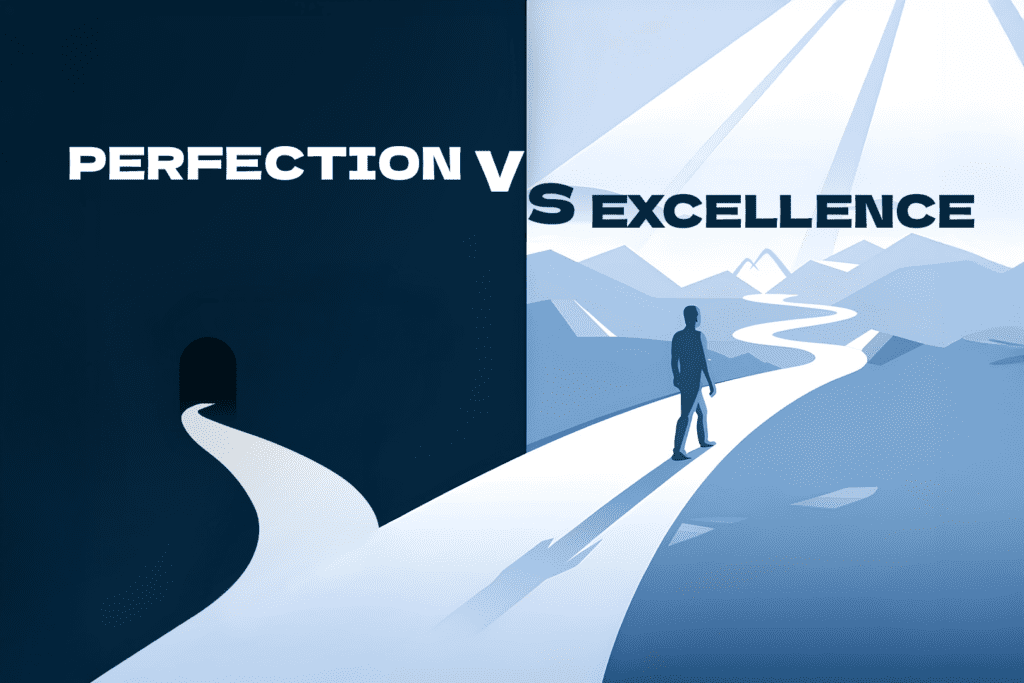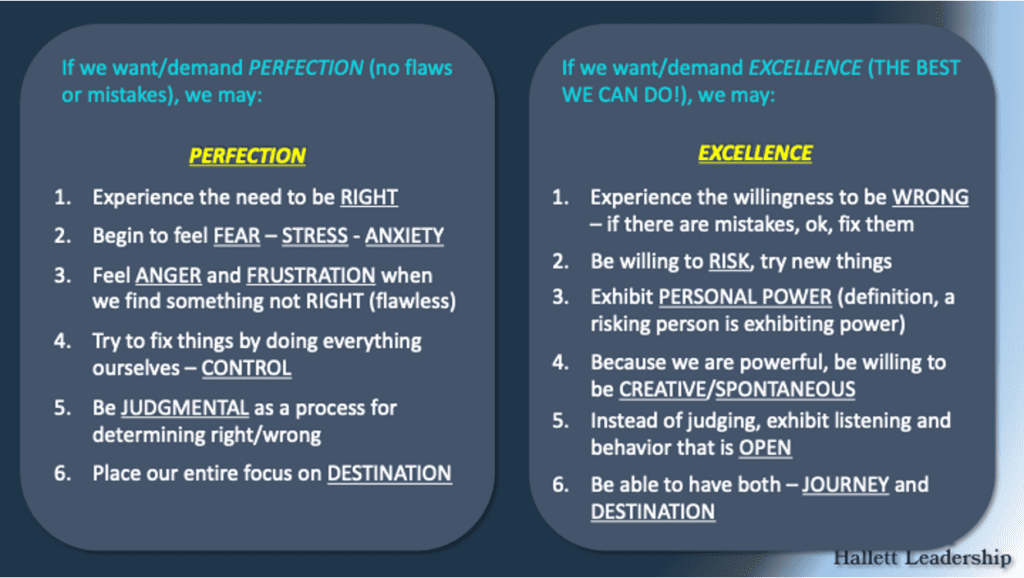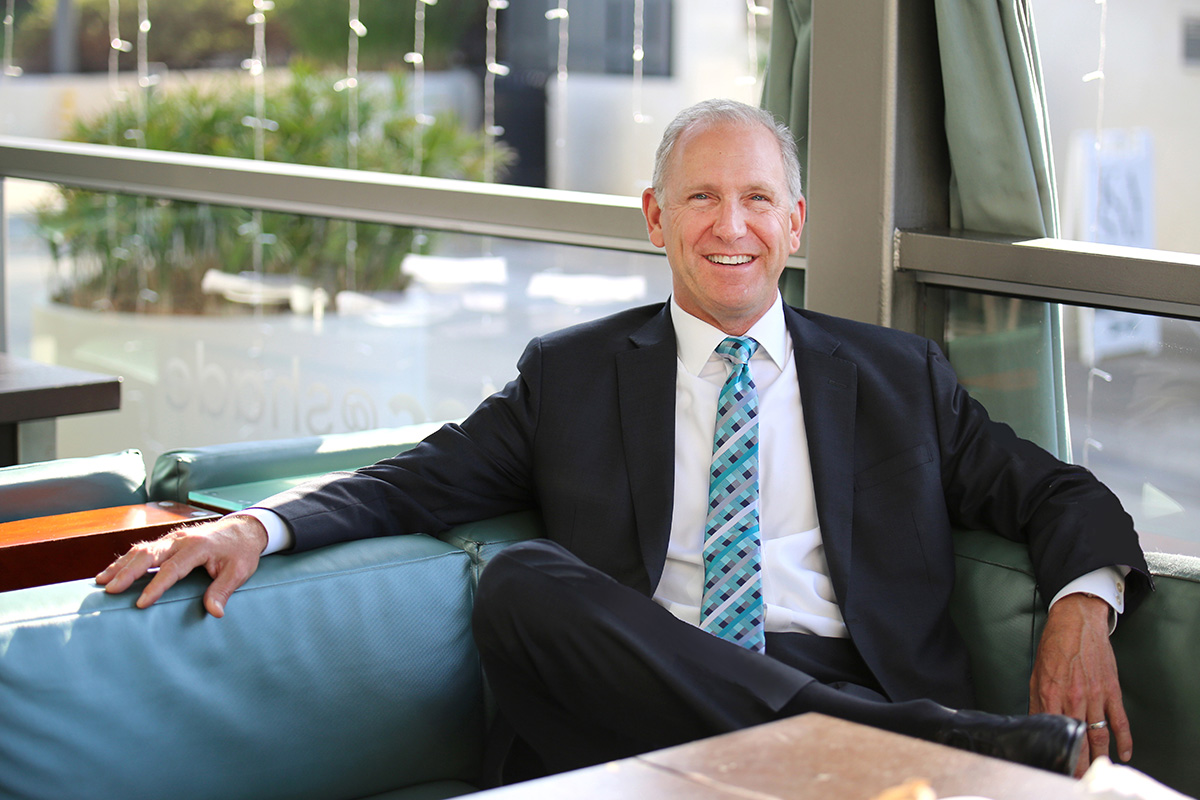
In the ever-evolving landscape of leadership, one key principle stands out: the most effective leaders demand excellence, not perfection. This distinction is crucial, as demanding excellence fosters innovation, resilience, and authentic growth within teams and organizations.
Understanding the Difference: Demanding Excellence vs. Perfection

Perfectionism is the relentless pursuit of flawlessness. It often stems from a fear of failure and can lead to micromanagement, stifled creativity, and burnout. Perfectionist leaders may set unattainable standards, leaving little room for mistakes or growth.
In contrast, excellence is about striving for the best possible outcome while acknowledging human limitations. It encourages continuous improvement, learning from mistakes, and valuing progress over perfection. Leaders who prioritize excellence set high standards but also foster an environment where innovation and collaboration thrive.
Whether striving for perfection or striving for excellence, results can be achieved, but the journeys are drastically different.
The Pitfalls of Perfectionism in Leadership

Perfectionism in leadership can have detrimental effects on both leaders and their teams. It often leads to:
- Micromanagement: A perfectionist leader may struggle to delegate tasks, fearing that others won’t meet their exacting standards.
- Inhibited Innovation: When mistakes are not tolerated, team members may be less likely to take risks or propose new ideas.
- Decreased Morale: Unrealistic expectations can lead to stress, burnout, and a decline in team morale.
Perfectionism can create a stressful and unproductive environment, where employees feel undervalued and anxious about meeting unattainable standards.
Embracing Excellence: A Healthier Approach

Leaders who focus on excellence rather than perfection cultivate a culture of growth and resilience. This approach includes:
- Encouraging Continuous Improvement: Recognizing that mistakes are opportunities for learning and development.
- Promoting Autonomy: Trusting team members to take ownership of their work fosters accountability and innovation.
- Celebrating Progress: Acknowledging and rewarding efforts and improvements, not just flawless outcomes.
The best leaders practice both high standards and gracious forgiveness, allowing team members to push themselves without the fear of failure.
NASA - Demanding Excellence

In 1961, President John F. Kennedy boldly declared that the United States would land a man on the Moon and return him safely to Earth before the decade was out. This statement, made during a time of intense competition with the Soviet Union in the space race, was both ambitious and inspiring. Although many believed it to be an impossible goal, Kennedy’s vision galvanized the nation and its scientific community. Wernher von Braun, then head of NASA’s rocket program, acknowledged the feasibility of reaching the Moon but expressed concern over a critical limitation: while NASA could send astronauts there, they lacked the technology to safely bring them back. The reentry process, with its extreme heat caused by friction with Earth’s atmosphere, posed a potentially deadly challenge.
To overcome this and other obstacles, NASA established multiple teams to work simultaneously on different aspects of the mission. These teams were encouraged to take risks, and failure was treated not as a setback, but as a crucial part of the learning process. Instead of hiding their mistakes, engineers and scientists shared their missteps openly so others could learn from them. This collaborative and transparent approach created a culture that fostered rapid innovation and creative problem-solving. Ultimately, this environment enabled NASA to achieve the seemingly impossible: the successful Apollo 11 mission in 1969, when Neil Armstrong and Buzz Aldrin walked on the Moon and safely returned to Earth.
The Role of Vulnerability and Authenticity
Authentic leadership involves acknowledging one’s imperfections and being open about challenges. This vulnerability builds trust and encourages open communication within teams.
Leaders who strive for authenticity, not perfection, are more relatable and respected. By admitting mistakes and showing genuine concern for their teams, leaders can foster a supportive and collaborative environment.
Hallett Leadership: Cultivating Excellence in Leaders

The pursuit of excellence over perfection is a hallmark of effective leadership. By setting high standards while embracing authenticity, vulnerability, and continuous improvement, leaders can inspire their teams to achieve remarkable results. Organizations that foster a culture of excellence are better equipped to adapt, innovate, and thrive in today’s dynamic business environment.
Hallett Leadership offers programs designed to develop authentic and effective leaders who demand excellence and build cultures where their teams can thrive. Our Accelerated Leadership Program (ALP) focuses on pursuing self-discovery, enhancing leadership skills, and fostering collaboration. Participants learn to embrace their authentic selves and lead with confidence and integrity.
Leadership is a learned skill, and investing in people drives employee engagement, loyalty, and commitment to a whole new level.




